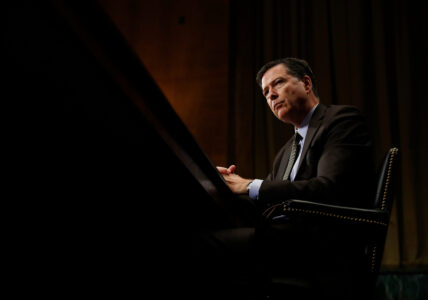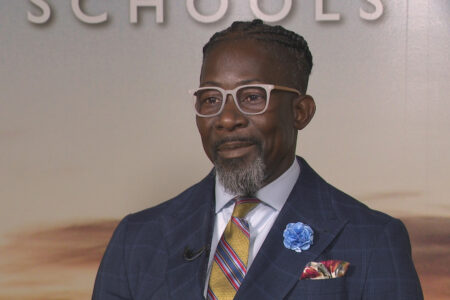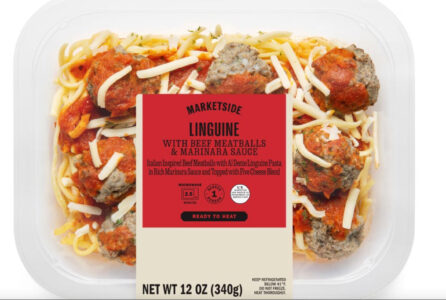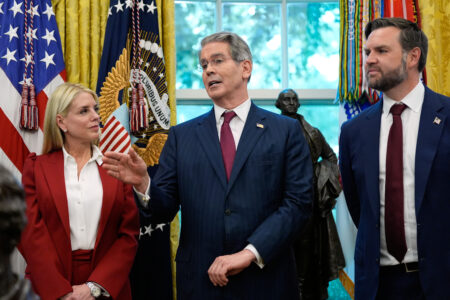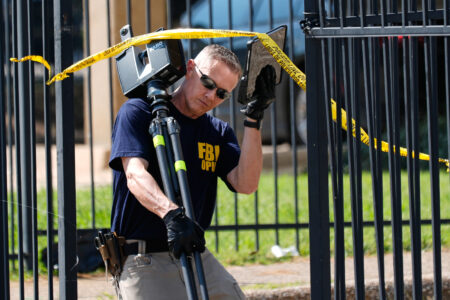Trump escalates retribution campaign with charges against James Comey
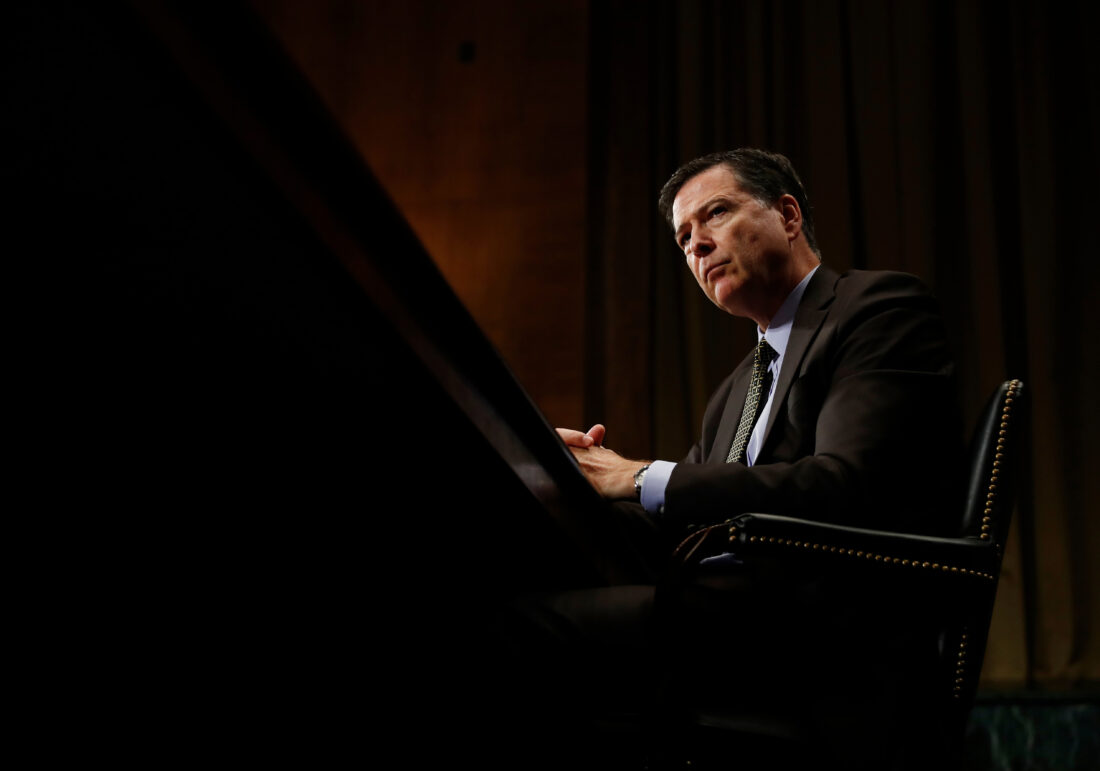
FBI Director James Comey pauses as he testifies on Capitol Hill in Washington, May 3, 2017, before the Senate Judiciary Committee hearing: "Oversight of the Federal Bureau of Investigation." (AP Photo/Carolyn Kaster, file)
NEW YORK (AP) — President Donald Trump’s unprecedented retribution campaign against his perceived political enemies reached new heights as his Justice Department brought criminal charges against a longtime foe and he expanded his efforts to classify certain liberal groups as “domestic terrorist organizations.”
Days after Trump publicly demanded action from his attorney general and tapped his former personal lawyer to serve as the top federal prosecutor in Virginia, former FBI Director James Comey, a longtime target of Trump’s ire, was indicted by a grand jury for allegedly lying to Congress during testimony in 2020.
Hours earlier Thursday, Trump signed a memorandum directing his Republican administration to target backers of what they dubbed “left-wing terrorism” as he alleged without evidence a vast conspiracy by Democrat-aligned nonprofit groups and activists to finance violent protests.
The developments marked a dramatic escalation of the president’s extraordinary use of the levers of presidential power to target his political rivals and his efforts to pressure the Justice Department to pursue investigations — and now prosecutions — of those he disdains. It’s a campaign that began soon after Trump returned to office and one that critics see as an abuse of power that puts every American who dares to criticize the president at risk of retaliation.
“Donald Trump has made clear that he intends to turn our justice system into a weapon for punishing and silencing his critics,” said Sen. Mark Warner of Virginia, the top Democrat on the Senate Intelligence Committee. The Comey indictment came less than a week after Trump installed a former White House aide and confidant to the role of U.S. attorney in the Eastern District of Virginia. The president had forced the ouster of his previous pick because he wasn’t sufficiently responsive to calls from Trump to bring charges against his longtime targets.
“This kind of interference is a dangerous abuse of power,” Warner said. “Our system depends on prosecutors making decisions based on evidence and the law, not on the personal grudges of a politician determined to settle scores.”
The first former president convicted of a felony — for falsifying business records to hide hush-money payments to conceal an alleged affair — Trump won the White House despite a host of other legal troubles over his alleged retention of classified information after leaving the White House in 2021 and his role in stoking denials of his 2020 electoral defeat that culminated in the Jan. 6 attack on the Capitol.
Thursday’s moves were the latest in a concerted effort by Trump to wield the vast powers of his office in unparalleled ways to punish his enemies since returning to the Oval Office in January. During his campaign, Trump made clear this was his intention if he returned to office.
“In 2016, I declared: I am your voice,” he said in 2023. “Today, I add: I am your warrior. I am your justice. And for those who have been wronged and betrayed, I am your retribution.”
Earlier this week, he signed an order designating a decentralized movement known as antifa — short for “anti-fascists” — as a domestic terrorist organization, a move testing broad First Amendment protections enjoyed by organizations operating within the United States.
The Thursday memo went further, targeting liberal-leaning groups and donors, and “represents a significant abuse of power where the government is either changing the law or bending definitions to try and investigate and punish their political opponents in a way that is really unprecedented,” said Caitlin Legacki, of Americans Against Government Censorship, which was founded to fight the Trump administration’s weaponization of the federal government against its political rivals.
As for Comey, she said, “It reeks of selective prosecution, it reeks of vindictive targeting and calls into question the integrity of many of the charges being brought by the office.”
Trump, meanwhile, denied Friday that he’s on a campaign of retribution.
“It’s about justice, really. It’s not revenge, it’s about justice. It’s also about the fact that you can’t let this go on,” he told reporters. “They are sick, radical left people and they can’t get away with it.”
Asked who is next on his list, he responded: “It’s not a list, but I think there’ll be others.”
Pressure campaign
Beyond Comey, Trump has also pressured prosecutors to bring mortgage fraud charges against New York Attorney General Letitia James, who brought a massive civil fraud case against the president. Attorney General Pam Bondi last month named a special prosecutor to investigate mortgage fraud allegations against James and Democratic U.S. Sen. Adam Schiff of California, another top Trump target. Both have denied wrongdoing.
The Justice Department has also begun examining mortgage fraud allegations against Lisa Cook, the Federal Reserve governor who’s won success in lower courts in challenging Trump’s effort to remove her from her job in a move she says is designed to erode the central bank’s independence. Trump has appealed to the Supreme Court to allow him to oust her.
On Friday, Trump called on Microsoft to fire former Deputy Attorney General Lisa Monaco, whom he has long held a grudge against, from her position as president of global affairs.
“Monaco’s having that kind of access is unacceptable, and cannot be allowed to stand,” he wrote. Trump previously stripped her of her security clearance, along with numerous others.
He has also stripped Secret Service protection from a slew of former officials, including his 2024 Democratic rival, Kamala Harris, members of former President Joe Biden’s family, and people who’ve fallen from favor, including his onetime national security adviser John Bolton and his former Secretary of State Mike Pompeo.
Trump has also targeted major institutions, revoking security clearances for attorneys at law firms he disfavors, pulling billions of dollars in federal research funds from elite universities, and securing multimillion-dollar settlements against media organizations in lawsuits that were widely regarded as weak cases.

